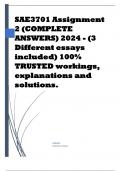SAE3701 Assignment
2 (COMPLETE
ANSWERS) 2024 - (3
Different essays
included) 100%
TRUSTED workings,
explanations and
solutions.
ADMIN
[COMPANY NAME]
, Moloi (2011) examines the influence of the Black consciousness philosophy
on both the teachers and learners at Bodibeng high school during the period
1940s – 1970s. Write an essay to respond to the question: Does politics still
have an influence on teachers and learners in the democratic era? (50)
Whether you think there is still political influence or not, please remember to
quote from the sources you have used to justify your response. Consult
Tshepo Moloi (2011) Bodibeng High School: Black Consciousness Philosophy
and Students Demonstration, 1940s–1976, South African Historical Journal.
Please note that you are required to consult as many sources as possible to
strengthen your argument.
ESSAY 1
Title: The Enduring Influence of Politics on Teachers and Learners in the Democratic Era
Introduction In examining the influence of politics on teachers and learners, Tshepo Moloi's
exploration of Bodibeng High School during the 1940s to 1970s offers valuable insights.
However, to assess the contemporary scenario, it is crucial to consider the broader context of the
democratic era in South Africa. This essay contends that politics continues to exert a significant
influence on both teachers and learners in the democratic era, albeit with nuanced manifestations.
Political Influence on Teachers Despite the transition to democracy, politics remains intertwined
with education in South Africa. The government's policies, educational reforms, and resource
allocation reflect political agendas that impact teachers' professional lives. For instance, the
South African Democratic Teachers Union (SADTU), a politically affiliated organization, wields
considerable influence, shaping educational policies and teacher appointments (Moloi, 2011).
Moreover, the legacy of apartheid continues to affect the teaching profession. The disparities in
educational infrastructure, funding, and resources persist, reflecting historical injustices shaped
by political decisions (Jansen, 2009). Teachers navigate the complexities of addressing these
inequalities while adhering to curricular mandates influenced by political considerations.
Furthermore, political ideologies often infiltrate the classroom environment. Teachers,
consciously or unconsciously, transmit their political beliefs, shaping students' perspectives
(Motala, 2006). The curriculum itself may be subject to political bias, with certain narratives
privileged or marginalized based on the prevailing ideological orientation of policymakers.
Political Influence on Learners Similarly, learners are not immune to political influences within
the educational system. The curriculum, designed and implemented by political authorities,
shapes students' understanding of history, society, and citizenship. For instance, debates over the




